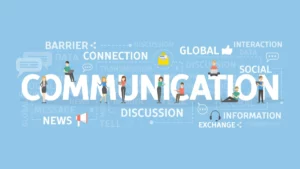Table of Contents
Key Takeaways:
- Clear, concise communication builds credibility and helps ideas stand out.
- Listening well and practicing empathy prevents misunderstandings.
- Tone and non-verbal signals directly shape professional relationships.
- Digital communication skills are essential for today’s workplace.
- Avoid over-explaining, negative phrasing, and failing to adapt to workplace culture.
Introduction
Starting a new job or internship marks a pivotal chapter in anyone’s career. The rush of fresh opportunities and the challenge of adapting to unfamiliar environments can make even the most confident graduate feel a hint of nervousness. As a fresher, communication isn’t just about talking—it’s about connecting, listening, and making an impression that lasts well beyond the first week.
Many first-time professionals quickly realize that technical skills alone aren’t enough to thrive. Employers value employees who can clearly share ideas, collaborate with different teams, and navigate workplace dynamics with poise. In a rapidly evolving work landscape—where remote meetings and digital updates are now routine—strong communication skills are the key that set people apart and propel them forward.
You might also like: What are the Methods for Effective Communication?
Top Tips for Effective Communication
1. Be Clear and Concise
- Before communicating, ask: What’s my main point? What does my audience need to know?
- Remove filler words, jargon, or over-complicated explanations. Instead of “It is a matter of utmost importance that all assigned individuals closely monitor progress,” say “Please track the task’s progress closely.”
- When sending messages or emails, use short paragraphs, bullet points, and highlight keywords. Clarity helps ideas stand out, especially when managers or teammates have little time for long reads.
- Example: During a team meeting, share updates succinctly. “Project A done, waiting for feedback. Project B started, will submit by Friday.” This reduces confusion and shows respect for everyone’s time.
2. Prepare Ahead of Time
- Plan the core message and rehearse key points before meetings, presentations, or even informal chats.
- For interviews, prepare stories and examples that showcase skills. Anticipate likely questions, such as “Describe a challenge you overcame,” and be ready with targeted answers.
- Before asking for feedback or a promotion, research benchmarks (like average salaries), and list out achievements or skills gained.
- Being prepared not only reduces stress but also signals professionalism to colleagues and managers.
3. Practice Active Listening
- Active listening means focusing wholly on the speaker—no texting, checking notifications, or thinking about a response while the other person is talking.
- Nod, maintain eye contact, and avoid crossing arms—these gestures signal genuine interest.
- After someone speaks, summarize or rephrase their point to confirm understanding. Example: “So if I understood correctly, you suggest starting with Option B?”
- Ask questions such as “Can you tell me more about this?” to encourage others to elaborate and feel heard.
4. Mind Your Non-Verbal Communication
- Non-verbal cues (facial expressions, posture, gestures) often speak louder than words. Mixed signals—like smiling while delivering negative feedback—can confuse or alienate colleagues.
- Stand tall during presentations, use open palms, and smile to convey confidence and honesty.
- Watch for signals from others, such as crossed arms or lack of eye contact, which indicate discomfort or disagreement. Address these gently by clarifying, listening, or providing reassurance.
5. Watch Your Tone
- The way words are spoken—intonation, volume, and pace—can impact how others receive the message. A friendly tone fosters collaboration while a rushed or harsh tone can spark misunderstandings.
- When communicating via email or messages, re-read the text to check if it might sound abrupt or harsh. Use polite greetings and closings, especially when conveying critical feedback.
- Example: Instead of “You missed the deadline,” consider “Let’s discuss what challenges you faced—how can I support you next time?”
6. Use the Right Medium
- Match your message to the medium. For confidential or sensitive discussions, opt for private, face-to-face chats or video calls.
- Routine updates or non-urgent queries are best suited to email or team messaging platforms.
- When working remotely, clarify which channels to use for urgent updates (“Use Slack for quick questions, email for documents”) to avoid confusion and make communication more efficient.
7. Bring Energy and Positivity
- A positive attitude is infectious. Smile, appreciate teammates’ contributions, and celebrate achievements.
- Express gratitude simply: “Thanks for helping out,” or “Great job on that presentation.” These small gestures build a friendly work culture and boost morale.
- Even when providing constructive feedback, start with a compliment or acknowledgment before moving to areas for improvement.
8. Don’t Over-Explain or Ramble
- It’s tempting to share extra background, but too much detail can overwhelm or bore listeners.
- Value others’ time by sticking to what’s relevant. If more information is needed, offer to share detailed resources after the call or meeting.
- When answering questions, provide a direct answer followed by a brief example, then stop unless more clarification is requested.
9. Avoid Negative Language
- Use positive framing whenever possible. Replace “I can’t do that” with “Here’s what I can do instead.”
- Avoid words like “never,” “fault,” or “failure”; these can discourage healthy discussion and idea-sharing.
- When disagreeing, use phrases like “I see your point, and here’s another approach to consider,” rather than “But that won’t work because…”.
10. Embrace Feedback
- Feedback is essential for growth. When someone points out an area for improvement, thank them—regardless of the delivery.
- Ask for regular reviews on communication style, such as “How did my presentation come across? Any tips for improvement?”
- Incorporating feedback quickly demonstrates adaptability and willingness to learn, which are highly valued by employers.
11. Stay Genuine
- Authentic communication fosters trust. Be yourself—admit when unsure, clarify when mistaken, and show humility.
- Trying to mimic someone else’s style or using scripted responses can appear insincere.
- Example: If unable to answer a question, say “I don’t have the answer right now, but I’ll find out and get back to you.” Such honesty strengthens professional relationships.
12. Respect Workplace Culture
- Every organization has its own communication style—formal, informal, or collaborative. Observe and adapt quickly.
- For multicultural or global teams, respect differences in customs, holidays, and etiquette. Adjust greetings and sign-offs as needed.
- If in doubt, ask the team or manager about preferred ways to communicate. Respecting the company’s culture reduces friction and speeds up integration.
13. Manage Emotions
- Awareness of personal emotions—such as frustration, excitement, or nervousness—prevents reactions that could damage relationships.
- Practice pausing before replying to difficult messages, especially in conflict situations. Take deep breaths, step away, and only continue when focused and calm.
- Learn techniques like journaling or short meditation to regulate stress, keeping communication effective under pressure.
14. Leverage Digital Communication Tools
- Get comfortable with common tools: email etiquette, instant messaging, collaborative docs, and video meetings.
- Use clear subjects, bullet points, and direct questions in digital messages to avoid misinterpretation.
- Regularly review and clarify communication protocols for remote work: “Reply within 24 hours,” or “Use the comment feature on docs for feedback.” Adapt to new tools quickly to stay efficient.
15. Build Connections and Empathy
- Take a personal interest in colleagues. Ask about their day, celebrate birthdays, and join team-building events.
- When conflicts arise, seek to understand the other person’s perspective. Ask questions like: “What’s your main concern?” or “How can I help?”
- Empathy nurtures trust and helps freshers earn respect, even with limited experience.
Boost Your Skills & Kickstart Your Career!
Employability and Personality Development Course by Entri App: Enhance your communication, confidence, and job-ready skills to excel in your career.
Join Now!Real Workplace Scenarios and Sample Dialogues
Seeing practical examples helps bridge the gap between theory and action. Here are some common scenarios and how a fresher might communicate effectively:
1. Asking for Clarification
- Scenario: You don’t fully understand a task assigned during a team meeting.
- Sample Dialogue:
“Thank you for outlining the project steps. I’d like to double-check one point to ensure I’m on the right track—could you clarify the timeline for my part?”
2. Receiving Constructive Feedback
- Scenario: Your manager gives feedback on your first project.
- Sample Dialogue:
“Thank you for sharing this feedback. I appreciate the suggestions for improvement and will focus on these points in my next task. If you have any resources or examples, I’d be grateful to review them.”
3. Politely Disagreeing in a Meeting
- Scenario: A teammate proposes a solution you believe could slow down the project.
- Sample Dialogue:
“I see the advantages of your approach. May I suggest an alternative that could help us meet the deadline faster? Perhaps we could combine elements of both ideas.”
4. Handling Miscommunication Over Email
- Scenario: Instructions were unclear, and work was submitted incorrectly.
- Sample Dialogue:
“I’d like to clarify the last assignment as I may have misunderstood the requirements. Could you help me understand the key priorities so I can make revisions accordingly?”
Practicing similar scenarios (even with friends or mentors) can boost confidence in handling real workplace situations.
Also read: Communication Skills for Success in Workplace
Communication in Leadership & Career Advancement
Strong communication isn’t just about landing a first job—it’s crucial for moving up the career ladder and stepping into leadership roles. Here’s how effective communication connects to growth:
- Influencing Teams & Leading Projects: Leaders guide, inspire, and motivate. Clear communication builds trust, aligns teams, and ensures everyone stays on track with project goals.
- Effective leaders explain the “why” behind tasks, not just the “what,” helping colleagues understand the bigger picture.
- Navigating Difficult Conversations: Whether giving feedback, resolving conflict, or mediating disagreements, leaders need to communicate with empathy and firmness. This skill keeps morale high and helps prevent small misunderstandings from escalating.
- Building a Professional Network: Advancing in your career often depends on connections and recommendations. Good communicators ask insightful questions, propose ideas, and maintain positive professional relationships—both inside and outside their teams.
- Personal Branding & Visibility: Leaders who express themselves with clarity—whether through presentations, public speaking, or written updates—quickly become recognized for their insights and reliability. These professionals are often trusted with more responsibility and considered first for promotions.
Focusing on communication from day one not only helps freshers settle in but also prepares them for leadership opportunities down the road.
People also read: An Introduction to Communication: Types and Barriers
Entri’s Career Level-up Course: Elevate Your Communication Skills
Communication isn’t just a skill—it’s the bedrock of professional success. For freshers eager to level up, Entri’s Career Level-up Course combines expert-led sessions, practical modules, and peer interactions to unlock impactful business, interview, and leadership communication. Learners gain confidence with mock interviews, public speaking exercises, group tasks, and positive psychology techniques—all tailored for modern workplaces. Investing in Entri’s course now means accelerating your career journey and gaining lifelong transferable skills for any industry.
Boost Your Skills & Kickstart Your Career!
Employability and Personality Development Course by Entri App: Enhance your communication, confidence, and job-ready skills to excel in your career.
Join Now!Conclusion
Communication shapes every part of the professional world—from team projects and client calls to personal growth and leadership. These expanded tips help freshers find their voice, foster trust, and contribute meaningfully no matter where they work. Embrace the journey as a learner and consider Entri’s Career Level-up course for a practical head start. The investment you make in mastering communication today will fuel your career for years to come.
Boost Your Skills & Kickstart Your Career!
Employability and Personality Development Course by Entri App: Enhance your communication, confidence, and job-ready skills to excel in your career.
Join Now!Frequently Asked Questions
Why is communication so important for freshers?
Communication sets the tone for teamwork, builds first impressions, and ensures new employees integrate smoothly into organizations. It’s linked to higher productivity and positive workplace outcomes.
What’s the biggest mistake freshers make in communication?
Common errors include talking too much, using jargon, and failing to listen actively. These can cause misunderstandings and set back professional growth.
How can one improve digital communication skills?
Practice writing concise emails, keep messages organized, learn business etiquette, and clarify protocols for remote work. Experimenting with tools like video chat and shared documents builds confidence.
How long does it take to improve communication skills?
Noticeable improvement can happen in weeks with regular practice and feedback. Continuous learning and self-reflection lead to mastery.
Can communication skills help with job interviews?
Yes! Employers consistently rank communication as a top skill. Clear, confident responses create positive impressions and increase hiring chances.

















